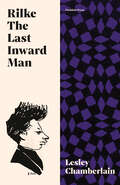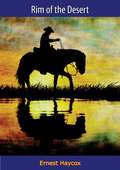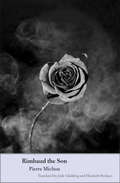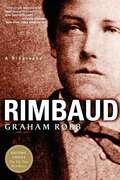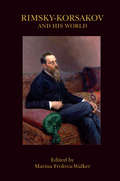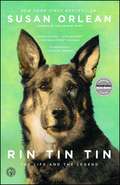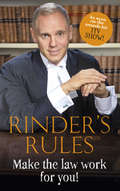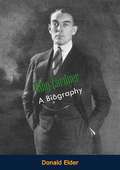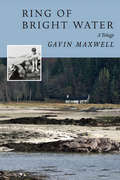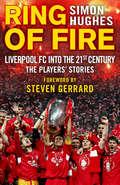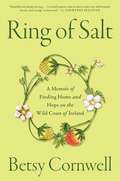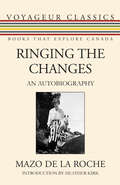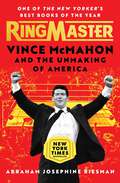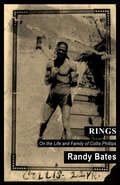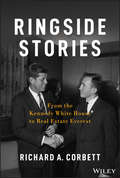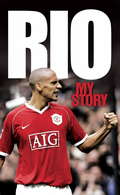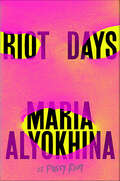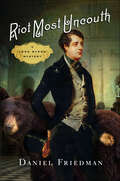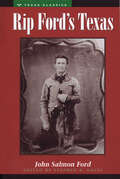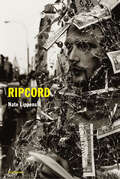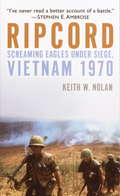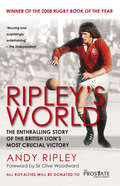- Table View
- List View
Rilke: The Last Inward Man
by Lesley ChamberlainAn incisive and intimate account of the life and work of the great poet Rilke, exploring the rich interior world he created in his poetryWhen Rilke died in 1926, his reputation as a great poet seemed secure. But as the tide of the critical avant-garde turned, he was increasingly dismissed as apolitical, as too inward. In Rilke: The Last Inward Man, acclaimed critic Lesley Chamberlain uses this charge as the starting point from which to explore the expansiveness of the inner world Rilke created in his poetry. Weaving together searching insights on Rilke's life, work and reception, Chamberlain casts Rilke's inwardness as a profound response to a world that seemed ever more lacking in spirituality. In works of dazzling imagination and rich imagery, Rilke sought to restore spirit to Western materialism, encouraging not narrow introversion but a heightened awareness of how to live with the world as it is, of how to retain a sense of transcendence within a world of collapsed spiritual certainty.
Rim of the Desert
by Ernest HaycoxTHE LAW OF LEAD IN THE WESTThe Broken Bit boys shot Sheriff Ben Borders after the nesters and law-abiders had re-elected him. Old Ben lay dying on the courthouse steps with Jim Keene looking down at him.“You stayin’?” said Ben.“I’ll be staying,” said Jim.“Well, when you get to the other side of the hill—remember this, son—the only thing you’ll find there is just what you brought with you.”Jim Keene had ridden a thousand miles to get to Cloud Valley and away from trouble. He was a strong man and a fighting man, but he always took sides. He couldn’t help fighting for the underdog. And when he got to Cloud Valley he found that he couldn’t run away from himself.With the sheriff dead, there was no law. So Jim Keene dealt himself in on the fight—on the side of the weak—and shot his way to justice…
Rimbaud the Son
by Pierre Michon Jody Gladding Elizabeth DeshaysRimbaud the Son, widely celebrated upon its publication in France, investigates the life of a writer, the writing life, and the art of life-writing. Pierre Michon in his groundbreaking work examines the storied life of the French poet Arthur Rimbaud by means of a new literary genre: a meditation on the life of a legend as witnessed by his contemporaries, those who knew him before the legends took hold. Michon introduces us to Rimbaud the son, friend, schoolboy, renegade, drunk, sexual libertine, visionary, and ultimately poet. Michon focuses no less on the creative act: What presses a person to write? To pursue excellence? The author dramatizes the life of a genius whose sufferings are enormous while his ambitions are transcendent, whose life is lived with utter intensity and purpose but also disorder and dissolution#151;as if the very substance of life is its undoing. Rimbaud the Son is now masterfully translated into English, enabling a wide new audience to discover for themselves the author Publishers Weekly called #147;one of the best-kept secrets of modern French prose. "
Rimbaud: A Biography
by Graham Robb"Superb...the single best work to read about this haunting and haunted poet."―Richard Howard, New York Times Book Review Unknown beyond the avant-garde at the time of his death, Arthur Rimbaud (1854-1891) has been one of the most destructive and liberating influences on twentieth-century culture. During his lifetime he was a bourgeois-baiting visionary, and the list of his known crimes is longer than the list of his published poems. But his posthumous career is even more astonishing: saint to symbolists and surrealists; poster child for anarchy and drug use; gay pioneer; a major influence on artists from Picasso to Bob Dylan. 1
Rimsky-Korsakov and His World: Not Assigned (The\bard Music Festival Ser. #43)
by Marina Frolova-WalkerA rare look at the life and music of renowned Russian composer Nikolai Rimsky-KorsakovDuring his lifetime, Nikolai Rimsky-Korsakov (1844–1908) was a composer whose work had great influence not only in his native Russia but also internationally. While he remains well-known in Russia—where many of his fifteen operas and various orchestral pieces are still in the standard repertoire—very little of his work is performed in the West today beyond Scheherezade and arrangements of The Flight of the Bumblebee. In Western writings, he appears mainly in the context of the Mighty Handful, a group of five Russian composers to which he belonged at the outset of his career. Rimsky-Korsakov and His World finally gives the composer center stage and due attention.In this collection, Rimsky-Korsakov’s major operas, The Snow Maiden, Mozart and Salieri, and The Golden Cockerel, receive multifaceted exploration and are carefully contextualized within the wider Russian culture of the era. The discussion of these operas is accompanied and enriched by the composer’s letters to Nadezhda Zabela, the distinguished soprano for whom he wrote several leading roles. Other essays look at more general aspects of Rimsky-Korsakov’s work and examine his far-reaching legacy as a professor of composition and orchestration, including his impact on his most famous pupil Igor Stravinsky.The contributors are Lidia Ader, Leon Botstein, Emily Frey, Marina Frolova-Walker, Adalyat Issiyeva, Simon Morrison, Anna Nisnevich, Olga Panteleeva, and Yaroslav Timofeev.The Bard Music FestivalBard Music Festival 2018Rimsky-Korsakov and His WorldBard CollegeAugust 10–12 and August 17–19, 2018
Rin Tin Tin: The Life and the Legend
by Susan OrleanHe believed the dog was immortal. So begins Susan Orlean's sweeping, powerfully moving account of Rin Tin Tin's journey from orphaned puppy to movie star and international icon. Orlean, a staff writer at The New Yorker who has been hailed as "a national treasure" by The Washington Post, spent nearly ten years researching and reporting her most captivating book to date: the story of a dog who was born in 1918 and never died. It begins on a battlefield in France during World War I, when a young American soldier, Lee Duncan, discovered a newborn German shepherd in the ruins of a bombed-out dog kennel. To Duncan, who came of age in an orphanage, the dog's survival was a miracle. He saw something in Rin Tin Tin that he felt compelled to share with the world. Duncan brought Rinty home to California, where the dog's athleticism and acting ability drew the attention of Warner Bros. Over the next ten years, Rinty starred in twenty-three blockbuster silent films that saved the studio from bankruptcy and made him the most famous dog in the world. At the height of his popularity, Rin Tin Tin was Hollywood's number one box office star. During the decades that followed, Rinty and his descendants rose and fell with the times, making a tumultuous journey from silent films to talkies, from black-and-white to color, from radio programs to one of the most popular television shows of the baby boom era, The Adventures of Rin-Tin-Tin. The canine hero's legacy was cemented by Duncan and a small group of others--including Bert Leonard, the producer of the TV series, and Daphne Hereford, the owner of the current Rin Tin Tin--who have dedicated their lives to making sure the dog's legend will never die. At its core, Rin Tin Tin is a poignant exploration of the enduring bond between humans and animals. It is also a richly textured history of twentieth-century entertainment and entrepreneurship. It spans ninety years and explores everything from the shift in status of dogs from working farmhands to beloved family members, from the birth of obedience training to the evolution of dog breeding, from the rise of Hollywood to the past and present of dogs in war. Filled with humor and heart and moments that will move you to tears, Susan Orlean's first original book since The Orchid Thief is an irresistible blend of history, human interest, and masterful storytelling--a dazzling celebration of a great American dog by one of our most gifted writers.
Rinder's Rules: Make the Law Work For You!
by Rob RinderToo many lawyers spout jargon... I’m here to cut the bulls**t. Robert RinderHave you had a holiday from hell? Been left with a hole in your floor by a dodgy builder? Fed up with fighting over who gets the dog after your divorce? Don't worry, criminal barrister Rob Rinder, star of the ITV hit show Judge Rinder and columnist for the Sun, is here to help you take action. From common legal woes to problems you may have, this is a collection of real-life stories of things gone wrong, for which he provides sound legal advice. With sections on jargon-busting, consumer rights and common mistakes, Rinder’s Rules provides a thorough guide to everyday legal issues that you can carry with you anywhere.This book is both incredibly informative and unbearably funny.
Ring Lardner: A Biography
by Donald ElderThis is more than a biography of the great humorist from Niles, Michigan. In a penetrating full-length portrait, Donald Elder has explored Ring Lardner’s whole world—the vibrant and inventive times in which he lived, the unforgettable people who surrounded him, and the impudent words that came from his typewriter.At the height of Lardner’s fame in the middle twenties he was known simultaneously as a baseball reporter unlike any the world had ever seen; a newspaper columnist part gadfly and part reporting etymologist; a writer of short stories as rich in native, idiom as they were polished in execution; and as a humorist who deplored the telling of “stories” as such. Whenever anyone said. “Stop me if you’ve heard this one, “Ring would never hesitate to say, “Stop.”Lardner spent an idyllic if somewhat unorthodox youth as the youngest among nine children—(at sixteen he knew how to say “Ich war ein und zwanzig Jahre alt,” to a gullible German-speaking local bartender). Mr. Elder chronicles the Lardner career from the earliest years through the sports-writing days in Chicago, his marriage and love of home life, and the continued flowering of his literary talents. Then comes the pathetic decrescendo in which he fought his appetite for liquor, tried to beat TB, and finally died at the age of 48, in 1933.Mr. Elder, who grew up in Ring Lardner's hometown, has included liberal selections from Lardner's writing all through the book, and there is a complete listing of all his published work at the end. Four years of meticulous research went into the writing of this valuable and entertaining appreciation of Ring Lardner's career.“A fine biography of Ring Lardner”—Kirkus Review
Ring of Bright Water: A Trilogy
by Gavin MaxwellThis classic memoir of otters in the Scottish Highlands and the naturalist who cared for them is “one of the outstanding wildlife books of all time” (New York Herald Tribune).While touring the Iraqi marshes, Gavin Maxwell was captivated by an otter and became a devoted advocate of and spokesman for the species. Maxwell moved to a remote house in the Scottish Highlands, co-habiting there with three otters and living an idyllic and isolated life—until fate, fame, and fire conspired against him. This volume weaves together the Scottish otter stories from Maxwell’s three non-fiction books, Ring of Bright Water, The Rocks Remain, and Raven Meet Thy Brother—and includes his beautifully expressive illustrations. Ring of Bright Water: A Trilogy stands as a lasting tribute to a man, his work, and his passion for another species.
Ring of Fire: Liverpool into the 21st century: The Players' Stories
by Simon HughesFollowing the success of Simon Hughes’ Red Machine and Men in White Suits, books which depicted Liverpool FC’s domination during the 1980s and its subsequent fall in the 1990s, Ring of Fire focuses on the 2000s and the primary characters who propelled Liverpool to the forefront of European football once again. With a foreword by Steven Gerrard, this is the third edition in a bestselling series based on revealing interviews with former players, coaches and managers. For Liverpool FC, entry into the 21st century began with modernisation and trophies under manager Gérard Houllier and development was then underpinned by improbable Champions League glory under Rafael Benítez. Yet that is only half of the story. The decade ended with the club being on the verge of administration after the shambolic reign of American owners, Tom Hicks and George Gillett.In Ring of Fire, Hughes’ interviewees – including Jamie Carragher, Xabi Alonso and Michael Owen – take you through Melwood’s training ground gates and into the inner sanctum, the Liverpool dressing room. Each person delivers fascinating insights into the minds of the players, coaches and boardroom members as they talk frankly about exhilarating highs and excruciating lows, from winning cups in Cardiff and Istanbul to the political infighting that undermined a succession of managerial reigns.Ring of Fire tells the real stories: those never told before by the key players who lived through it all.
Ring of Salt: A Memoir of Finding Home and Hope on the Wild Coast of Ireland
by Betsy CornwellMaid meets Under the Tuscan Sun in this inspiring and lyrical memoir about a writer and mother who flees an abusive marriage and must learn to reclaim the story of her life through a search for home on Ireland&’s wild, western coast.At twenty-four, Betsy Cornwell runs away to Ireland for a fresh start. Leaving behind a painful past, she chases her dream of becoming a novelist to the misty shores of the Aran Islands. There she meets a handsome and charming horse trainer, and her life takes on the glow of a fairy tale when they elope to Gretna Green. Five years later, her happy ending has twisted into a nightmare. Betsy is trapped in an abusive marriage, isolated and afraid with a newborn baby. On her son&’s first birthday, she must flee home again, this time turning to the women around her—her local survivor support group, a trusted family friend, and an online Smith College alumnae network—for help she&’d never known she could ask for. After a brush with homelessness, she struggles to scrape together a living for herself and her son. On sleepless nights, she scrolls through real estate listings that might as well be castles in the air, and starts to foster an impossible dream: What if she could use her writing to buy a home, one that no one could take away from her and her baby? One that might become a haven, not just for her family, but other single parent artists and writers, too? When she discovers a historic knitting factory and former cinema on Ireland&’s rugged Connemara coastline, left empty and crumbling for years, that precarious dream becomes her lifeline. Over the next two years she works to crowdfund the old knitting factory&’s purchase by sharing its story and her own, in candid posts that range from the unexpectedly steep learning curves she encounters with home renovations and internet dating, to her heartbreaking fight to keep custody of her son, with her growing online community. But as the deadline to buy nears, she realizes she will have to reckon with everything she believes about family, survival, and what happily-ever-after truly means for her dream to have any chance of coming true. Ring of Salt combines a powerful and relatable narrative of survivorship and healing with lush writing about the windswept landscapes and rich mythology of rural Ireland to craft a real-world fairy tale about the ordinary, but no less life-changing, forms of magic we can all access: vulnerability, community, and the power of telling your own story.
Ring the Night Bell: the Autobiography of a Surgeon
by Paul B. MagnusonVery readable, entertaining, fascinating historical facts about the early years of the Veterans Administration and medicine before 1950.
Ringing the Changes: An Autobiography
by Mazo De La Roche Heather Kirk Michael GnarowskiFirst published in 1957, Mazo de la Roche’s last autobiography is a vivid look at her life in Ontario, and a parting shot at her critics. Mazo de la Roche was once Canada’s best-known writer, loved by millions of readers around the world. Her Jalna series is filled with unforgettable characters who come to life for her readers, but she herself was secretive about her own life and tried to escape the public attention fame brought. In this memoir, de la Roche describes her childhood and her relationship with her cousin and life-long companion, Caroline Clement. She confesses her personal connection with her troubled character Finch Whiteoak and details her romantic struggles. Ringing the Changes is the closest view we have of Mazo de la Roche’s innermost thoughts and the private life she usually kept hidden.
Ringmaster: Vince McMahon and the Unmaking of America
by Abraham Josephine RiesmanINSTANT NEW YORK TIMES BESTSELLER NPR&’s 2023 Books We Love &“Riveting, essential reading.&” —Rick Perlstein, author of Reaganland The definitive biography of Vince McMahon, former WWE chairman and CEO, charts his rise from rural poverty to the throne of one of the world&’s most influential media empires—and features never-before-seen research and exclusive interviews with more than 150 people who witnessed, aided, and suffered from his ascent.Even if you&’ve never watched a minute of professional wrestling, you are living in Vince McMahon&’s world. In his four decades as the defining figure of American pro wrestling, McMahon was the man behind Dwayne &“The Rock&” Johnson, &“Stone Cold&” Steve Austin, John Cena, Dave Bautista, Bret &“The Hitman&” Hart, and Hulk Hogan, to name just a few of the mega-stars who owe him their careers. For more than twenty-five years, he has also been a performer in his own show, acting as the diabolical &“Mr. McMahon&”—a figure who may have more in common with the real Vince than he would care to admit. Just as importantly, McMahon is one of Donald Trump&’s closest friends—and Trump&’s experiences as a performer in McMahon&’s programming were, in many ways, a dress rehearsal for the 45th President&’s campaigns and presidency. McMahon and his wife, Linda, are major Republican donors. Linda was in Trump&’s cabinet. McMahon makes deals with the Saudi government worth hundreds of millions of dollars. And for generations of people who have watched wrestling, he has been a defining cultural force. Accessible to anyone, regardless of wrestling knowledge, Ringmaster is an unauthorized, independent, investigative chronicle of Vince McMahon&’s origins and rise to supreme power. It is built on exclusive interviews with more than 150 people, from McMahon&’s childhood friends to those who accuse him of destroying their lives. Far more than just an athletics or entertainment biography, Ringmaster uses Vince&’s story as a new lens for understanding the contemporary American apocalypse.
Ringo: A Fab Life
by Tom DoyleRingo Starr&’s eventful and remarkable life laid bare in a first-of-its-kind mosaic biography of one of the greatest musicians of all time. Often overshadowed by his former bandmates, Starr&’s remarkable story is no less compelling. &‘Ringo: A Fab Life&’ highlights a life so jaw-droppingly eventful that one is left wondering how he also had time to become one of the best musicians on the planet. Through an episodic, mosaic format critically acclaimed author Tom Doyle takes readers through the ride of a lifetime, from Starr&’s brushes with death as a child bought up in poverty, through to dizzying heights of fame and success with The Beatles and beyond. By examining pivotal moments, anecdotes and cautionary tales, we see Starr soar as part of the biggest band in the world - and then try and cope with life outside of it: a film career, misadventures with friends, children&’s TV narrator, furniture designer, marriage to a Bond girl, before eventually finding peace and sobriety as one of the elder statesmen of rock. So much more than another Beatles related biography, we follow Starr&’s career far beyond the rose-tinted sixties, through the various addictions and career left turns in the seventies and eighties, before reaching the 1990&’s, his legacy and reputation intact. The life of Richard Starkey is long overdue a proper inspection and this book - with exclusive new interviews conducted by Doyle with, amongst others, Starr himself - provides a never-before-seen level of detail that will delight hardcore fans and curious readers alike.Ringo: A Fab Life - hilarious, moving, insightful and constantly surprising - is the definitive account of one of the greatest living musicians and the uncontested best drummer in The Beatles.
Rings: On the Life and Family of a Southern Fighter
by Randy BatesIn this momentous debut, Randy Bates finds in the daily lives of one American family the pathos and drama we usually associate with the finest fiction. Rings is strict, however, in presenting only actual people and incidents. <P><P>The book takes as its protagonist Collis Phillips, a black man who, one generation away from slavery managed to turn a youth of caddying:, shoe shining, and running bootlegged whiskey into a career as a successful boxer in New Orleans during the days of Jim Crow. But by the time Randy Bates, a young white man, first met him in 1979 Collis Phillips was facing more difficult obstacles. Shot and seriously injured by one of his daughters while at the top of his game as a trainer, Phillips had endured the suicide of one son and the long-term incarceration of two others in the Louisiana State Penitentiary at Angola, one of the most dangerous maximum security prisons in the country.Over the next ten years Randy Bates followed Collis Phillips, his children, grandchildren, great-grandchildren, and even great-great-grandchildren, not only as a biographer but as a friend. After his first-hand experience of boxing in the gym Bates watched the Phillipses triumph in the ring; later, he sat at the trials of two generations of Phillips men and attended the funerals of others. He saw at close range the acute rigors of poverty, racism, and neglect; and he witnessed, too the strength and resilience of a family that has suffered and survived.Like James Agee's Let Us Now Praise Famous Men, Rings finds the heart of American heroism in people who have had little chance to stake their claim to the American dream. With a historian's eye for detail and a poet's graceful style, Randy Bates has written a shattering, multigenerational saga of urban American life.This revised edition of Rings includes an Afterword written by the author in 2013.This book is not a tour but a journey; its end as uncertain as its departure, its passage supremely moving and revealing ...RINGS is a book of quixotic fidelity. It has a quixotic wackiness, as well. But as in [Cervantes'] book that the adjective comes from, it is wackiness in the service of revelation.-Richard Eder, The Los Angeles Times BOOK REVIEWA powerful, moving chronicle of triumph over despair-Publishers Weekly(starred review)This is more than a boxing book. It is a well-crafted narrative about American ghetto life and the impact of racism on the lives of many black Americans .... Highly recommended-Library Journal(starred review)
Ringside Stories: From the Kennedy White House to Real Estate Everest
by Richard A. CorbettFollow the life of a celebrated guru, from hardscrabble boy to self-made man In Ringside Stories, real estate guru Dick Corbett reveals the secrets to his success in business and in life, tracking the rough-and-ready life of a man who won't accept failure as an outcome. Setbacks large and small are taken as lessons for the future, and one small success leads to another, larger one until the dream achieved is grander than any restless youth could have imagined. In Corbett's long and remarkably successful career, his commitment to economic development and growth management have been stunningly reflected in the more than one billion dollars of complex real estate ventures he's financed, developed, and constructed—including International Plaza, a three million square foot mixed-use retail, office, and hotel development at Tampa's International Airport. Corbett's work has generated thousands of permanent jobs, hundreds of new commercial sales entities, office space, adjunct hotels, and restaurants—all producing hundreds of millions of dollars annually for the regional economy. Richard A. Corbett's story begins with an alcoholic mother, an absentee father, and a search for self that resulted in boxing titles, street smarts, wilderness survival skills, degrees from Notre Dame and Harvard, a spot on the Kennedy presidential campaign, and later a place at Robert Kennedy's side when he died. This book documents the events that built this remarkable life, with lessons learned and wisdom gained. Mine the insight of a recognized real estate investing guru Learn how delicate relationships contributed to Corbett's success See the Kennedy family from the inner circle's perspective Discover how sheer ambition built Tampa's International Plaza Life is precious—everyone gets exactly one. Few can say they've truly lived, but Corbett's experiences mark him as a man who has been there, done that. Ringside Stories is the story of how wisdom found a truly self-made man.
Rio
by Rio FerdinandRio Ferdinand is widely acknowledged as one of the most talented and skilful defenders in the world. His transfer from West Ham to Leeds was a British record at the time, a feat he achieved again with his subsequent move to Manchester United. Ferdinand's success on the pitch has been meteoric; including high drama in the Champions League, three World Cups and a dramatic Premiership victory. Here, for the very first time, Ferdinand reveals all about his infamous missed drugs test, the controversies surrounding both his transfers, his supposed reluctance to re-sign for United in 2005, the alleged tapping-up meeting with Chelsea's Peter Kenyon and various tabloid headlines involving partying and women.
Rio
by Rio FerdinandRio Ferdinand is widely acknowledged as one of the most talented and skilful defenders in the world. His transfer from West Ham to Leeds was a British record at the time, a feat he achieved again with his subsequent move to Manchester United. Ferdinand's success on the pitch has been meteoric; including high drama in the Champions League, three World Cups and a dramatic Premiership victory. Here, for the very first time, Ferdinand reveals all about his infamous missed drugs test, the controversies surrounding both his transfers, his supposed reluctance to re-sign for United in 2005, the alleged tapping-up meeting with Chelsea's Peter Kenyon and various tabloid headlines involving partying and women.
Riot Days
by Maria AlyokhinaA Pussy Rioter’s riveting, hallucinatory account of her years in Russia’s criminal system and of finding power in the most powerless of situationsIn February 2012, after smuggling an electric guitar into Moscow’s iconic central cathedral, Maria Alyokhina and other members of the radical collective Pussy Riot performed a provocative “Punk Prayer,” taking on the Orthodox church and its support for Vladimir Putin’s authoritarian regime.For this, they were charged with “organized hooliganism” and were tried while confined in a cage and guarded by Rottweilers. That trial and Alyokhina’s subsequent imprisonment became an international cause. For Alyokhina, her two-year sentence launched a bitter struggle against the Russian prison system and an iron-willed refusal to be deprived of her humanity. Teeming with protests and police, witnesses and cellmates, informers and interrogators, Riot Days gives voice to Alyokhina’s insistence on the right to say no, whether to a prison guard or to the president. Ultimately, this insistence delivers unprecedented victories for prisoners’ rights.Evocative, wry, laser-sharp, and laconically funny, Alyokhina’s account is studded with song lyrics, legal transcripts, and excerpts from her jail diary—dispatches from a young woman who has faced tyranny and returned with the proof that against all odds even one person can force its retreat.
Riot Most Uncouth (A Lord Byron Mystery)
by Daniel Friedman1807, Cambridge, England.A young woman is murdered in a boarding house, and nobody knows what to do about it. The volunteer watchman who patrols the streets of this placid college town has no idea how to investigate a serious crime and the private bounty hunters the girl's family has hired to catch the killer employ methods that are questionable, at best.What Cambridge needs is a hero, and, in a situation such as this, it's very easy for a gentleman with a romantic disposition to mistake himself for one.19 year-old Lord Byron, the outlaw poet, is a student at Trinity College, though he can only be described as a "student" in the loosest sense of the word: He rarely attends class and, instead, spends his time day-drinking, making love to faculty wives, and feeding fine cuisine and expensive wine to the bear he keeps as a pet.Catching a killer seems like a fine diversion, however, and Byron decides that solving the crime must take precedence over other, less-urgent matters such as his failing grades and mounting debts.Written by the Edgar Award-nominated author of Don't Ever Get Old, which Publishers Weekly called "wickedly funny," and inspired by Byron's moody, sexy and often hilarious poems and letters, this dark, twisty mystery will keep you guessing until its violent conclusion.
Rip Ford's Texas (Personal Narratives of the West)
by John Salmon FordAn original source history detailing the years of Texas&’s independence and annexation from a nineteenth-century Texas Ranger and politician. The Republic of Texas was still in its first exultation over independence when John Salmon &“Rip&” Ford arrived from South Carolina in June of 1836. Ford stayed to participate in virtually every major event in Texas history during the next sixty years. Doctor, lawyer, surveyor, newspaper reporter, elected representative, and above all, soldier and Indian fighter, Ford sat down in his old age to record the events of the turbulent years through which he had lived. Stephen Oates has edited Ford&’s memoirs to produce a clear and vigorous personal history of Texas.
Ripcord (Semiotext(e) / Native Agents)
by Nate LippensA novel about escape and connection, class, sex, and queer intimacy in the American Midwest.The oldest story: an insider pretends to be an outsider and receives praise for his empathy and imagination and intelligence. Maybe some asshole even says bravery. An outsider pretends to be an insider, is exposed as a fraud, a liar, and burned to the ground.In Ripcord, Nate Lippens continues his meditations on escape and connection, class, sex, and intimacy. Stuck in Milwaukee, the narrator cobbles together a living by bartending and catering weddings, enmeshed in a semiaffair with a younger, married man. Cruising apps while tallying his youthful romantic failures, he fantasizes about disappearance but finds both solace and frustration in his friendships with Charlie, an aging punk who was prominent in the 1990s Chicago queercore scene, and Greer, a painter who never broke through but continues making work.
Ripcord: Screaming Eagles under Siege, Vietnam 1970
by Keith NolanOn April 10, 1970, Hill 927 was occupied by troopers of the Screaming Eagles of the 101st Airborne Division. By July, the activities of the artillery and infantry of Ripcord had caught the attention of the NVA (North Vietnamese Army) and a long and deadly siege ensued. Ripcord was the Screaming Eagles' last chance to do significant damage to the NVA in the A Shau Valley before the division was withdrawn from Vietnam and returned to the United States. At Ripcord, the enemy counterattacked with ferocity, using mortar and antiaircraft fire to inflict heavy causalities on the units operating there. The battle lasted four and a half months and exemplified the ultimate frustration of the Vietnam War: the inability of the American military to bring to bear its enormous resources to win on the battlefield. In the end, the 101st evacuated Ripcord, leaving the NVA in control of the battlefield. Contrary to the mantra "We won every battle but lost the war," the United States was defeated at Ripcord. Now, at last, the full story of this terrible battle can be told.From the Paperback edition.
Ripley's World: The Enthralling Story of the British Lion's Most Crucial Battle
by Andy RipleyWinner of the National Sporting Club's prestigious British Rugby Book of the Year Award for 2008, Ripley's World transforms and redefines the genre of the sports autobiography. In a moving and intimate memoir, Andy Ripley, England rugby icon and victorious British Lion, television Superstar and world rowing champion, reflects on a life of sporting achievement and confronts his most powerful and dangerous challenge yet - his diagnosis with prostate cancer. Told with typical candour and courage, it is an absorbing and inspirational story.
